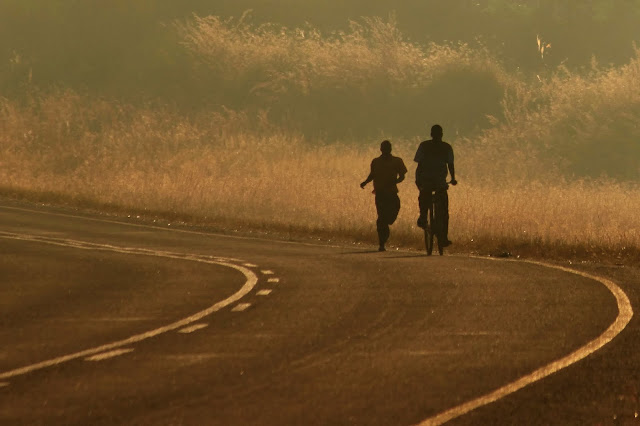23/5/10
After yet another long day driving we arrived in the capital city of Malawi late last night. As with every time we end up driving round in the dark things went wrong. A truck of that size is not easy to manoeuvre, and getting lost and the resulting 3 point turns are no fun. We arrived too tired to deal with our own tents and gratefully accepted the offer of an upgrade to ready made cozy bedded tents for the pricely sum of $1.
Up again at 5.30 today. These early dark mornings are loosing their novelty. 30 minutes into the journey and we're climbing up slight hills at 15km an hour, before pulling over and trying to solve the never ending power problem. We waste thirty minutes at the side of the road and set off no faster. The truck is definitely on it's last legs. People are starting to get irritated. We leave an hour before any other truck and arrive hours after them. Activities and exploration time is cut short due to never ending drives. We are experiencing Africa only through a truck window. Getting up at 5.30 so we can make 400 km in a day is silly. There is now talk of hiring minibuses. It is really hard for Gareth and John, our guide and driver, it's their first trip with this company and they are having to deal with a dying bus.
Malawi, country number 5 on our tour. It has been called Africa for beginners, with it's wide range of activities, beautiful scenery and apparently the most helpful and friendly people on the whole continent. Not sure the first Western explorers to arrive here would have agreed, missionaries who came here to do their stuff. Hundreds died for every Malawian that they managed to convert to Christianity. Malaria is pretty rife here.
Malawi is a relatively small country, 900km long and between 70 and 150 km wide. A lot of this area is taken up by Lake Nyassa which separates the country from Mozambique. With a population of about 14 million in such a small area, it has one of the highest population densities in Africa. The towns we have been through have had vibrantly hectic streets; people milling everywhere, markets bustling and music and singing. As with Zambia, kids appear every time we stop to watch us, and can be seen sitting in the dirt barefooted and in rags. They shout 'Mazungu', meaning white person when we pass. You can't help but be affected by this sight when you see it so often. It hurts me that they have so little and we have nothing to really give them that would make a difference. In the past we have been told not to give kids pencils are pens as gang leaders often make kids go out and practice begging then take whatever they get. We've been told that doesn't happen here and that they are just grateful for anything that they can take to school. With an average GDP of $170 school equipment doesn't come high up on the list of priorities.
Contrary to all appearances, John says that as far as African countries go, Malawi is now doing ok. In 2005 there were drouts and famines that crippled the country but it has recovered for now. Life expectancy is about 40.
One interesting fact I've learnt about Malawi...the first president here, President Banda who had control of Malawi from 1966-1994, had some rather curious habits. As with many African presidents he leaned towards the dictatorship style of leadership, but his eccentric behaviour went as far as wearing ganster clothes and hats, waving a flywhip around and having dancing girls follow him around whenever in public, all dressed in clothes made from cloth with his face printed on it. They were there to chant praises at him.
























